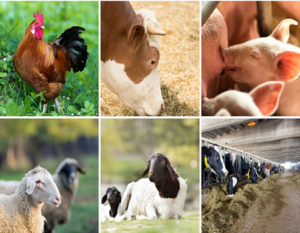
Animal husbandry is the branch of agriculture concerned with animals that are raised for meat, fibre, milk, eggs, or other products. It includes day-to-day care, selective breeding and the raising of livestock. Husbandry has a long history, starting with the Neolithic revolution when animals were first domesticated, from around 13,000 BC onwards, antedating farming of the first crops. By the time of early civilisations such as ancient Egypt, cattle, sheep, goats and pigs were being raised on farms.
Major changes took place in the Columbian exchange when Old World livestock were brought to the New World, and then in the British Agricultural Revolution of the 18th century, when livestock breeds like the Dishley Longhorn cattle and Lincoln Longwool sheep were rapidly improved by agriculturalists such as Robert Bakewell to yield more meat, milk, and wool.
A wide range of other species such as horse, water buffalo, llama, rabbit and guinea pig are used as livestock in some parts of the world. Insect farming, as well as aquaculture of fish, molluscs, and crustaceans, is widespread. Modern animal husbandry relies on production systems adapted to the type of land available. Subsistence farming is being superseded by intensive animal farming in the more developed parts of the world, where for example beef cattle are kept in high density feedlots, and thousands of chickens may be raised in broiler houses or batteries. On poorer soil such as in uplands, animals are often kept more extensively, and may be allowed to roam widely, foraging for themselves.
Most livestock are herbivores, except for pigs and chickens which are omnivores. Ruminants like cattle and sheep are adapted to feed on grass; they can forage outdoors, or may be fed entirely or in part on rations richer in energy and protein, such as pelleted cereals. Pigs and poultry cannot digest the cellulose in forage, and require other high-protein foods.
The Bachelor’s Degree in Animal Production is competitive. Knowing the prerequisites will enable you have seamless registration and also avoid unnecessary mistakes.
This page provides the following:
- O’Level Subjects and Requirements;
- Direct Entry Subject and Requirements;
- UTME Subjects Combination;
- And other useful information that will enable you to make the right choices so that you gain admission to study this course.
Please read the admission requirements below carefully. If you meet the required prerequisites you may proceed with your UTME/Direct Entry registration.
PLEASE NOTE: There are variations to the requirements listed below in some universities. In that case, it’s advisable you make references to the PDF version of JAMB Brochure.
List of Universities Offering:
ANIMAL PRODUCTION
- ADAMAWA STATE UNIVERSITY, MUBI, ADAMAWA STATE – ADSU
- ABUBAKAR TAFAWA BALEWA UNIVERSITY, BAUCHI, BAUCHI STATE – BAUCHI
- FEDERAL UNIVERSITY OF TECHNOLOGY, MINNA, NIGER STATE – MINNA
- MICHAEL OKPARA UNIVERSITY OF AGRICULTURE, UMUDIKE, ABIA STATE – UMUDIKE
ANIMAL PRODUCTION AND FISHERIES
- CRAWFORD UNIVERSITY, IGBESA, OGUN STATE – CRAWFORD
ANIMAL PRODUCTION AND HEALTH
- FEDERAL UNIVERSITY OF TECHNOLOGY, AKURE, ONDO STATE – FUTA
- LADOKE AKINTOLA UNIVERSITY OF TECHNOLOGY, OGBOMOSO, OYO STATE – LAUTECH
ANIMAL PRODUCTION AND HEALTH SERVICES
- EKITI STATE UNIVERSITY, ADO-EKITI, EKITI STATE – EKSU
- FEDERAL UNIVERSITY OF AGRICULTURE, ABEOKUTA, OGUN STATE – FUNAAB
UTME and Direct Entry Requirements to Study Animal Production
Direct Entry Requirement for Animal Production:
Two A Level passes or equivalent in Chemistry and one of Biology/Botany /Zoology/Agricultural Science/ Geography/Geology/ Mathematics/Economics.
UTME Requirement for Animal Production:
Five SSC credit passes in Chemistry, Mathematics, Biology/Agricultural Science, Physics and English Language.
UTME Subject combination for Animal Production:
Chemistry, Biology/Agricultural Science and Physics/Mathematics.
NOTE: Kindly make references to JAMB Brochure for remarks/waiver for Animal Production.
ALSO READ:
18 Most Dangerous Animals in the World
World Most Intelligent Animals Top 10
9 Contrasts Between Animal Cells and Plant Cells
JAMB Subjects for Animal Breeding and Genetics
Top 8 Extinct Animals: Vanished from Existence
Leave a Reply